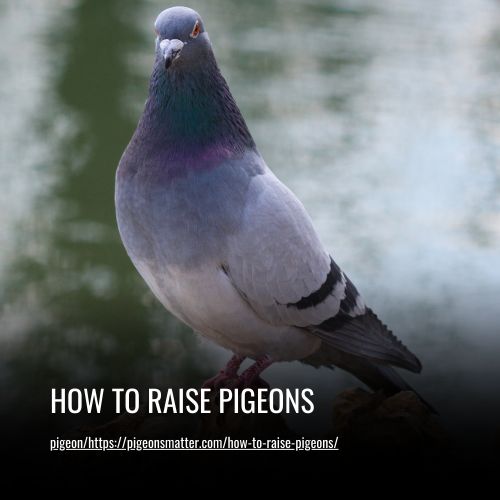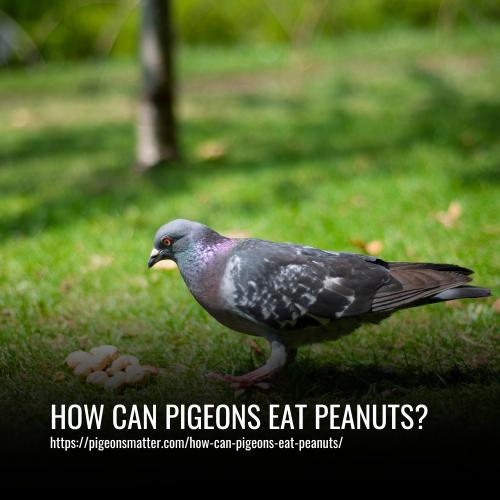Raising pigeons can be an engaging and rewarding pastime for many. Whether kept as a hobby, for profit, or as a food source, domestic pigeons are a popular choice. To successfully raise these birds at home, knowing the best practices is essential.
Implementing proper techniques and practices will ensure the best results for your pet pigeons. This includes providing clean and fresh water, a healthy diet, and a comfortable living space. Owning and caring for pet pigeons requires responsibility and dedication, but the joy and satisfaction it brings makes it well worth it in the end.
If you’re considering adding a pet pigeon to your family, it’s important to do your research and learn as much as you can before committing. By following best practices and giving your pigeons the care they require, they’ll make wonderful companions and provide endless entertainment and joy.

Which Breed of Pigeon Is Best?
There’s good news for pigeon enthusiasts: the breed of pigeon you choose to raise doesn’t matter as much as the care you provide. Whether you opt for homing pigeons or feral rock pigeons, implementing proper techniques and practices is key to their success.
It’s worth noting that there are around 300 breeds of pet pigeons to choose from. These breeds are typically separated into three groups: sporting, fancy, and utility. Each group offers distinct characteristics, but ultimately, the quality of care provided is what makes the biggest difference in their overall health and well-being.
When deciding on a breed of pigeon, it’s important to consider factors such as temperament, size, and personality. However, regardless of which breed you choose, ensuring they have access to clean water, a healthy diet, and a comfortable living space is essential. By prioritizing their care and well-being above all else, your pigeons will thrive and bring you joy for years to come.
The Best Practices for Raising Pigeons
To ensure the health and happiness of your pet pigeons, it’s crucial to follow best practices when raising them. Here are some key guidelines to keep in mind:
- Pairs: Raising your pigeons in pairs can help ensure their social needs are met and prevent loneliness.
- Secure and comfortable housing: Your pigeons should have a safe, secure, and comfortable living space, ideally in a well-ventilated loft away from predators and harsh weather.
- Controlled living environment: Be sure to maintain a clean and controlled environment, including proper temperature and humidity levels and regular pest control measures.
- Healthy food: A balanced diet of quality seed and protein sources is essential for your pigeons’ overall health.
- Clean water: Make sure your pigeons always have access to fresh, clean drinking water.
- Well-designed nest boxes: Nest boxes that allow for easy cleaning and proper drainage are important for maintaining a healthy living environment for your birds.
- Parasite control: Prompt action is key in controlling and preventing parasites among your pigeon flock.
- Disease and injury prevention and treatment: Signs of illness or injury should be taken seriously and treated promptly to maintain the overall health and well-being of your pigeons.
- Bathing access: Pigeons require regular bathing to maintain their feather condition, so be sure to provide a secure and accessible source of water.
- Flypens and perches: Enclosures that allow your pigeons to fly and perch are crucial for overall health and wellbeing.
- Banding: Banding your pigeons can help with easy management and identification within your flock.
By following these best practices, you can help your pet pigeons enjoy a healthy and happy life under your care.
1. Raise Pigeons in Pairs (Very Important):
It is crucial to keep your pet pigeons in pairs, specifically one male and one female, to ensure their social needs are met and prevent loneliness. This can be done by making sure that you buy an even number of birds. Although they typically pair themselves, some may need assistance in finding a mate. If that’s the case, you can lock them in a nest box for a few days, and when released, they will bond with a mate.
It is important to note that pairing will only occur between pigeons that share similar characteristics and behaviors. So, when deciding which pigeons to pair, look for birds that have compatible personalities and habits.
Keeping your pigeons in pairs promotes a healthy and happy environment. They can socialize with each other, keep each other warm, and work together to take care of their young. By ensuring that your pigeons have a pair, you are taking a proactive approach to their overall well-being.
2. Providing Secure and Comfortable Housing for Your Pigeons:
It is crucial to ensure that your pigeons have a secure and comfortable place to live. Here are some tips to help you provide the best housing for your feathered friends.
- Install More Than One Coop: Pigeons can be territorial and aggressive towards each other, so it is vital to house them in separate coops if they do not get along. Several coops will also give your pigeons enough space to fly around and get some exercise.
- Ensure Maximum Security: Pigeons are vulnerable to predators, so it is essential to provide secure housing for them. Your coops should be made of durable metal sheets or wood and wire mesh. Ensure that the doors are strong and secured to keep predators away.
- Design and Materials Should be Comfortable: The coops’ design and materials should be comfortable for the birds. The metal sheets and wires should be fixed appropriately to prevent injuries or scratches. Soft lining materials, such as grass or clothing, can improve the comfort of the coops. A landing board or trap should be installed at the door to enable the birds to access the coop easily.
- Maintain Cleanliness: Cleaning the coops daily helps prevent parasites and diseases from affecting your pigeons. Feathers and feces tend to accumulate faster, so it is best to clean the coops regularly, preferably every morning.
- Recommended Nesting Box: The Precision Pet nesting box is a spacious and useful coop that delivers both security and comfort for your pigeons. Made of durable wood, it provides a safe sleeping and breeding ground for your feathered friends. A landing board and a strong wire mesh on the front ensure easy entry and maximum security.
3. Control the Living Environment:
Pigeons are known to be sensitive to weather changes and cannot adapt well to extreme temperatures, winds, or rain. It is, therefore, essential to control their living environment to prevent your birds from suffering ill health.
To keep your pigeons comfortable during the winter months, you may want to consider using a heating system to maintain a warm temperature. Conversely, during the hotter months, bedding materials should be reduced while ventilation increased to keep their living environment cooler and more comfortable.
If your pigeon house is located in an area prone to strong winds, it is essential to install wind barriers around the houses to protect the birds. These barriers can help to minimize the damage caused by strong winds and prevent the birds’ stress levels from rising tremendously.
4. Provide Enough Healthy Food:
To maintain the health and well-being of your pigeons, it is important to provide them with a healthy and balanced diet. Their primary diet consists of grains and seeds, but it’s important to ensure that the grains provided have low moisture content as high-moisture grains can lead to vomiting and diarrhea. Some popular grains include wheat, corn, barley, and sorghum, while ready-made commercial feeds are also available to improve their diet.
Seeds are also an important part of their diet and pigeons love to eat peas, legume seeds, soybeans, and peanuts. To enable young pigeons to feed on them easily, it’s recommended to break the seeds into smaller pieces. By combining two or more seeds, you can ensure that your pigeons get all the necessary nutrients. Newly hatched birds are fed by adult pigeons, so you don’t need to worry about feeding them.
Grit is also an essential addition to their diet since it contains important minerals and supports proper digestion. Common grit materials include oyster shells, salt, limestone, charcoal, and bone powder containing calcium, sulfur, iodine, iron, and other essential minerals. You can supplement their diet with products like Kaytee oat groats that contain probiotics to support healthy digestion.
5. Provide Enough Clean Water:
Providing clean water is crucial to keeping your pigeons healthy and happy. Ensuring that your birds have access to an adequate supply of fresh water is vital and should be available to them at all times. Placing water close to their food can help promote hydration and keep them comfortable.
Using specially designed waterers can be an effective way to encourage drinking and keep water clean. You can invest in automatic waterers that maintain a consistent supply of fresh water throughout the day. Be sure to regularly check and clean the waterers to prevent the buildup of harmful bacteria or algae that can cause infections and illness.
It’s also important to consider the quality of the water you provide. Make sure the water is clean, clear, and free of contaminants. Using a filtration or purification system can help remove chemicals, minerals, and bacteria that may be present in your water source.
6. Provide Well-Designed Nest Boxes:
Nest boxes are essential for both egg-laying and raising young pigeons. To build a standard nest box, the recommended dimensions are 24 inches in length, 12 inches in width, and 14 inches in depth. Half of the box should be closed, while the other half should be open and covered with a wire mesh to ensure adequate ventilation and security. Additionally, the interior of the box should be lined with nesting material to provide comfort and protection for the eggs and hatchlings.
7. Provide Well-Designed Nest Boxes:
Nest boxes play a significant role in providing a comfortable and secure space for pigeons to lay eggs and raise their young. A standard nest box typically measures 24 inches in length, 12 inches in width, and 14 inches in depth. One-third of the box should have an opening covered with wire mesh to ensure proper ventilation without compromising their safety.
It’s essential to regularly clean and maintain the nest boxes to provide a healthy environment for the pigeons. Adding nesting materials within the interior of the box offers a sense of comfort and protection for the eggs and hatchlings. By providing a well-designed nest box, you create a perfect start for healthy pigeon offspring.
8. Prevent and Control Parasites Promptly:
Parasites can significantly affect the attractiveness and productivity of your pigeons. Common parasites among pigeons include mites, lice, fleas, ticks, mosquitoes, and worms. Keeping the habitats of your birds clean is the best way to prevent parasites from infecting them. Ensure the coops, food, and water troughs, fly pens, perches, and nest boxes are cleaned regularly and sanitized whenever possible.
Promptly detect any signs of parasite infestation and counteract with a suitable pesticide or insecticide. Affected birds should be quarantined to minimize the spread of parasites. If the situation escalates to severe stages, it’s advisable to seek assistance from a veterinarian. Ensure that the birds are healthy by preventing and controlling parasites promptly.
9. Prevent and Treat Diseases and Injuries Accordingly:
As a pigeon owner, it is important to take proactive measures to prevent and control diseases. Poultry diseases can be deadly and highly infectious and may wipe out your entire flock in as little as a week. Common pigeon diseases like pox, Newcastle, and influenza can be easily prevented by maintaining cleanliness in areas where the birds live. Regularly disinfecting the pigeon houses, food and water containers, fly pens, perches, and nest boxes, is crucial in keeping the fowl healthy. Additionally, vaccinating your pets will go a long way in preventing the spread of diseases.
In the event of a disease outbreak, it is important to quarantine the affected birds and treat them promptly. If you are unsure of the disease, seek help from a veterinarian as soon as possible. Proper disposal of dead birds through burying or burning can help control the spread of disease.
10. Secure Baths for Your Pigeons:
As a pigeon owner, it is essential to provide secure and clean bathing areas for your beloved birds. Pigeons love to take a refreshing bath when the weather is warm, and it is important to provide them with bathing containers or water pots to help them wash and cool their bodies.
It is highly recommended to supply fresh water to the baths every day to prevent the growth of harmful bacteria and parasites that can cause diseases. Dirty water in the bathing containers may quickly become a breeding ground for germs that can affect the overall health of your birds.
Regularly cleaning the bathing area will ensure that your pigeons have a clean and secure environment. It is also recommended to use a simple bird-safe disinfectant to clean the bathing area to prevent diseases and bacteria growth.
11. Provide Flypens and Perches:
When introducing new birds into your flock, a fly pen should be used to prevent them from flying away while still providing ample exercise and space for them to move around. Constructed from wire mesh, a standard fly pen is 16 feet long, 5 feet wide, and 6 feet high.
Perches are a vital addition to a flypen, allowing your birds to rest and recover after exercise. Make sure that there are plenty of these structures throughout the flypen to accommodate all of the birds.
By providing your birds with a flypen and ample perches, you can ensure that they receive exercise while preventing the risk of them flying away, supporting their overall health and well-being.
12. Band Your Pigeons for Easy Management:
Banding or striping your pigeons can serve various management purposes that benefit bird enthusiasts. One of the most compelling reasons to band your birds is to easily distinguish each one from the other. This method is especially useful when you are dealing with a group of young birds that closely resemble one another.
Another management purpose for banding your pigeons is to keep track of the birds participating in sports. By banding them with different strips, you can easily identify which bird is which and avoid losing them during competitions.
Moreover, banding some of your birds also enables you to keep tabs on their growth progress. Bands or strips come with distinctive numbers which help you monitor the development of your birds.
Raising Pigeons for Meat:
If you’re looking for a unique protein source for your homestead, consider raising pigeons for meat. While this may not be common practice in America, it’s a traditional and well-known source of protein in other countries.
One such country is Italy, where the ancient Etruscans utilized pigeons as a primary food source. Living underground in their town of Orvieto, the Etruscans were limited in their ability to produce feed for livestock, but pigeons could forage on their own.
Pigeons don’t require regular feeding, making them an efficient source of meat for those with limited resources. Young pigeons can be harvested as early as 26 days after hatching, with full-grown birds ready for processing as early as 40 days.
1. Surviving a siege:
Exploring the underground system in Orvieto, we discovered an intriguing medieval dovecote lined with pigeon holes. Upon further discussion with our guide, we learned how the Etruscans utilized the pigeons to survive the two-year siege. During the siege, food supplies became scarce, leaving the Etruscans with limited resources to sustain themselves. However, they quickly realized that pigeons could be a crucial source of food.
The pigeons were left to forage on their own, making them an efficient and sustainable protein source. Their meat could be harvested as early as 26 days after hatching, providing a steady supply of food in times of hardship. The Etruscans also utilized pigeon milk, a secretion produced in the crop of the parent pigeon, to nourish their young.
Creating a dovecote like the one seen in Orvieto could be a valuable addition to any homestead or survivalist’s strategy. The pigeons require minimal care and space, making them an ideal source of protein in times of crisis. By providing nesting bowls or boxes and a landing board, one can easily encourage the pigeons to return to the same roost night after night.
Why pigeons make sense:
Communities that have laws prohibiting the raising of chickens should consider the alternative option of domestic pigeons. Unlike chickens, pigeons have been overlooked in many communities, making them a great loophole option for those seeking a sustainable alternative.
While pigeons can forage on their own, breeders suggest providing a healthy and balanced diet to ensure their health and egg production. However, their feed budget is relatively low, making them an economically feasible option. Besides, should there be a need, domestic pigeons make an excellent option for the provision of protein, especially if no other options for food are available.
During the Great Depression, many American households were dependent on pigeons for their survival. Pigeons were an accessible and reliable source of protein that kept families from suffering from starvation. Why wait for prolonged economic difficulties before adopting this sustainable option? Domestic pigeon keeping is more than just a hobby or a source of protein – it is a responsible and proactive choice for sustainability and self-sufficiency.
FAQs
Pigeons primarily feed on grains like corn, wheat, and peas, supplemented with pigeon feed available in pet stores. They should be fed once or twice a day, offering an amount they can consume in about 30 minutes.
Pigeons need a spacious loft or coop with good ventilation and protection from predators and the elements. Provide perches, nesting boxes, and clean bedding material like straw or wood shavings. Ensure the area is dry and cleaned regularly to prevent disease.
Start by gradually increasing the distance pigeons fly from their loft, allowing them to get familiar with the area. Training involves incremental releases, initially short distances, and gradually extending them while rewarding birds that return promptly with food and positive reinforcement.
Pigeons can be susceptible to diseases like respiratory infections, parasites, and injuries. Regular health checks, proper hygiene, access to clean water, balanced nutrition, and vaccinations can help prevent many health issues. Quarantine new birds before introducing them to the existing flock.
Ensure your pigeons are of breeding age (usually around 6 months old), healthy, and well-fed. Provide nesting materials and boxes in a quiet area of the loft. Pigeons typically lay two eggs, and both parents share incubation duties for around 18 days before the chicks hatch.
Determining pigeon gender can be challenging. Visual cues like size and behavior are often not reliable. However, experienced breeders may differentiate based on the cooing sound, the width of the pelvic bones (females tend to have wider gaps), or by observing mating behavior.
Conclusion
Raising domestic pigeons can offer a sustainable and affordable source of food and fertilizer for homesteaders and those interested in alternative fowl. With various breeds to choose from, such as racing and fancy pigeons, pigeon-keeping can also be an enjoyable hobby with the possibility of adding a new pet to your household.
In addition, pigeons have proven to be a valuable source of protein during times of scarcity or economic hardship. Their eggs, while less frequent in laying than chickens, are still edible and can provide a useful supplement to your diet. Their manure also makes an incredible high-nitrogen fertilizer, making them a useful addition to any garden or farm.



